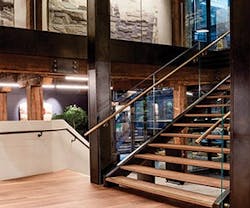In just seven years, west elm’s president, James (Jim) Brett, has catapulted the company into full-scale lifestyle-brand status. The name known for top-of-the-line home furnishings broke onto the commercial office scene with the successful launch of west elm Workspace with Inscape at NeoCon 2015, and it will soon become a player in the hospitality industry with west elm Hotels, set to roll out in late 2018 in five strategically selected mid-tier cities in the U.S.
Brett credits this growth with the understanding and realization that retail expansion no longer simply equals adding more stores to a company’s
portfolio. “That’s not a relevant way of thinking about the business anymore,” he said. “You have to grow your business by broadening your relationship with consumers and the role that you play in their lives.”
But for Brett it goes much deeper than simply offering new venues for consumers to engage with west elm product. He believes that to truly make that relationship a meaningful one, west elm needed to reconnect the buyers with the concept of handcraftsmanship by entrenching them in the cultures—both local and global—that it stems from. But first, he felt an obligation to put a more solid definition behind the company’s commitment to selling handcraft.
Enter the Clinton Global Initiative (CGI).
Former President Bill Clinton established the CGI community in 2005 in order to address some of the world’s most pressing challenges. Members range from foundations to companies to government organizations that are tasked with creating action plans that will bring them to their established goals—goals that will make the world a better place. For west elm, those included building up communities of artisans in need
of guidance to better care for their crafts, their businesses, and most importantly, themselves as human beings.
A few years after making this CGI Commitment to Action to make 20 percent of west elm product handcrafted (as defined by UNESCO) and
purchase $35 million worth of handcrafted goods, Brett decided to take it one step further by joining forces with Fair Trade USA. To date, the organization pledged to certify 20 percent of its offerings Fair Trade by 2017 and 40 percent by 2019, but the journey all started with the purchasing of rugs in India.
“I always believe in piloting a program in the area that it will be most difficult to implement, because if you can implement it there successfully, you know it’s scalable,” Brett explained. And as west elm worked with Fair Trade in India to certify business aspects such as living wages and safety conditions within various factories, it uncovered a growing problem of a lack of self-value amongst the workers.
“You realize the biggest part of this isn’t about the money we are giving them,” he continued. “The value of the program is the education around how to think about this money and what actually are your needs. And that needs-identification process was very humbling for us.”
During west elm’s time in India, it was discovered that women workers at a bedding factory in the south of India were often sick with infections because they weren’t changing sanitary pads. “Because to them, that is too selfish,” Brett said. “Every penny should be going to the kids and the family.” Moving forward, the company created a package distributed with every paycheck that included sanitary napkins, a toothbrush and toothpaste, soap, and other toiletries to help with basic hygiene. This small move improved health and therefore attendance amongst both the female as well as male workers.
“Their self-confidence and self-values were stronger and they learned the lesson that they have to prioritize themselves first,” he noted. “You bear this burden of responsibility of the whole family, but if you don’t put yourself first you’re going to struggle to fulfill that obligation.”
west elm and Fair Trade continued to help the artisans throughout India problem solve and better manage their money to improve quality of life. For instance, they purchased bicycles to get to and from work rather than spending about 25 percent of their paychecks on Tuk Tuks.
When Brett returned to India about a year ago, he was touched to see the workers at the bedding factory had come full circle. “I always like to go back to the same group we started with,” he said. “I always want to know how they are spending their money and what their latest initiatives are.” He found that they were now donating to a local orphanage. “So women who weren’t dealing with basic sanitary needs a year ago are now the philanthropists of their community. I always like to tell that story because I think Fair Trade is such a big, thoughtful approach to educating people and training themselves to lift out of poverty.”
west elm hasn’t stopped there, supplementing these Fair Trade initiatives with its own literacy and vocational programs in countries like Haiti and the Philippines. “We continue to challenge ourselves around the people who are making our products and really being their champion and telling their story,” Brett explained. “By telling it, we reintroduce the consumer to the maker, which has become such a distanced relationship. And that brings a real human element to the purchase, providing connective properties that set us apart from just any mass-produced product off the shelf.”
It takes courage desperately needed in today’s society to celebrate, rather than debase, the diverse rainbow of cultures that make up our world, and to hold the hands of those less fortunate, rather than reject them. With that, Brett has proven to be a new breed of CEO that cares more about perpetuating the traditions that make our industry so exciting than his company’s bottom line.
About the Author
AnnMarie Martin
Editor-in-Chief
AnnMarie is the former Editor in Chief of i+s and has been covering the commercial design space. Her style and vision has helped the brand evolve into a thought leader in purpose-driven design and cultural movements shaping the way we live and work.

